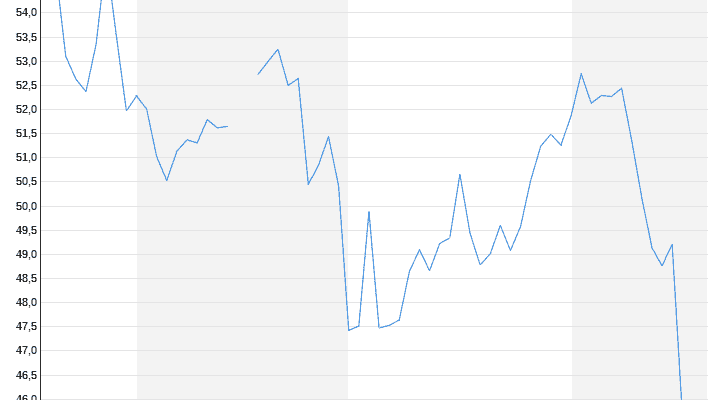More electricity from coal
Utilities want to jump aside Habeck
06/20/2022, 8:21 p.m
In order to stock up on gas storage, Minister of Economics Habeck brings the increased burning of coal to generate electricity into play. As a result, companies announce that they are open to longer run times for coal-fired power plants. The coal phase-out in 2030 should remain the same.
After the emergency measures to reduce gas consumption in Germany announced by Federal Minister of Economics Robert Habeck, suppliers are exploring extending the operating times of their coal-fired power plants. German utility RWE could continue to operate three lignite-fired power plants, each rated at 300 megawatts (MW), if asked to do so, the company announced. The Neurath C, Niederaußem E and F power plants are part of a list of possible stand-by plants drawn up by the ministry in May in the event of serious disruptions to Russian gas supplies. The hard coal electricity producer Steag was also willing to temporarily offer more capacity.
Habeck announced measures to increase gas storage for next winter over the weekend, citing increased burning of coal to generate electricity as an option to save gas needed for industrial processes. Electricity producers could therefore switch from gas to coal-fired power plants for a transitional period – but do not have to, as the Ministry of Economic Affairs emphasized. Above all, it is planned that certain coal-fired power plants could be used again to a limited extent. In view of the fact that gas deliveries from Russia via the Nord Stream 1 Baltic Sea pipeline have been falling for days, there is growing concern about a lack of supply, even if, according to Habeck, this is currently still guaranteed.
Additional capacity of up to ten gigawatts
The background to this is the gas supplies that have been throttled by Russia for a few days. According to its own statements, the energy group Uniper is currently receiving less than half of the agreed gas quantities. The Italian Eni and the Austrian OMV are also affected by lower gas deliveries from Russia. “It’s a tense situation,” said Uniper boss Klaus-Dieter Maubach. The supplier is willing to let its coal-fired power plants run longer, he explained at an energy conference in Essen. Plants in Heyden, Staudinger and Scholven could be considered. At the power plant in Wilhelmshaven, on the other hand, “the point of no return” has been reached.
The gas storage facilities in Germany were about 57.6 percent full on Monday, and the trend is rising. However, the Gas Storage Act prescribes a filling level of 80 percent for October and even 90 percent for November. The reintroduction of coal-fired power plants could add up to 10 gigawatts of additional capacity if gas supplies reach critical levels, according to the Economy Ministry. A corresponding law is to go into the Federal Council on July 8, and the activation of the gas replacement reserve by ministerial decree is also in the works.
Despite all the problems with the gas supply, according to the Ministry of Economic Affairs, SPD co-head Lars Klingbeil and Green party co-head Omid Nouripour, the coal phase-out should remain in 2030. In addition, a gas auction model is to be launched in the summer, which should create incentives for industrial gas consumers to save gas. The Chemical Industry Association (VCI) welcomed the model. “Market-based instruments are better for our companies than government coercive measures,” explained the VCI. Gas savings are only possible at chemical sites where there are still alternatives for generating process heat. This could be old oil-fired boilers or combined heat and power plants that are fired with coal.
BASF wants to become independent of fossil energy
With a share of 15 percent, the chemical industry is the largest consumer of natural gas in Germany. The world’s largest chemical company, BASF, initially did not want to comment on Habeck’s emergency measures, but explained that natural gas was still being supplied to all European locations as needed. There are therefore no shutdowns or throttling. BASF is working on significantly reducing its dependence on fossil energy, especially gas, in the medium term. This also includes a rapid switch to renewable energies in the power supply.
The Leverkusen-based plastics group Covestro sees no opportunities to save energy to any significant extent in the short term. Covestro is selectively examining the possibility of generating energy from sources other than gas – for example in steam boilers at the Brunsbüttel plant, which can also be operated with oil. However, this could be implemented at the end of the year at the earliest.
For the time being, Volkswagen is sticking to the conversion from coal-fired power generation to gas operation at its main plant in Wolfsburg. “In the event of a continued reliable supply of natural gas, the heat and power generation will be secured as planned by the operation of modern gas turbines,” said a company spokesman. “If the necessary gas supply cannot be provided without restrictions, the location has the option of continuing to use hard coal as an energy source and, during a transitional period, using the existing systems to meet the electricity and heat requirements for the Wolfsburg plant and to supply heat to many private households in the city to guarantee.”
